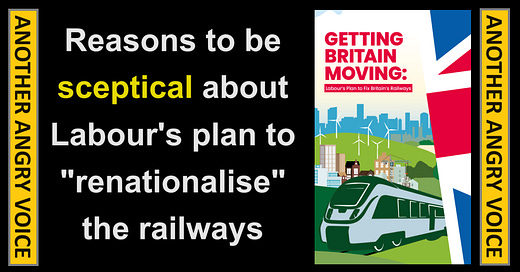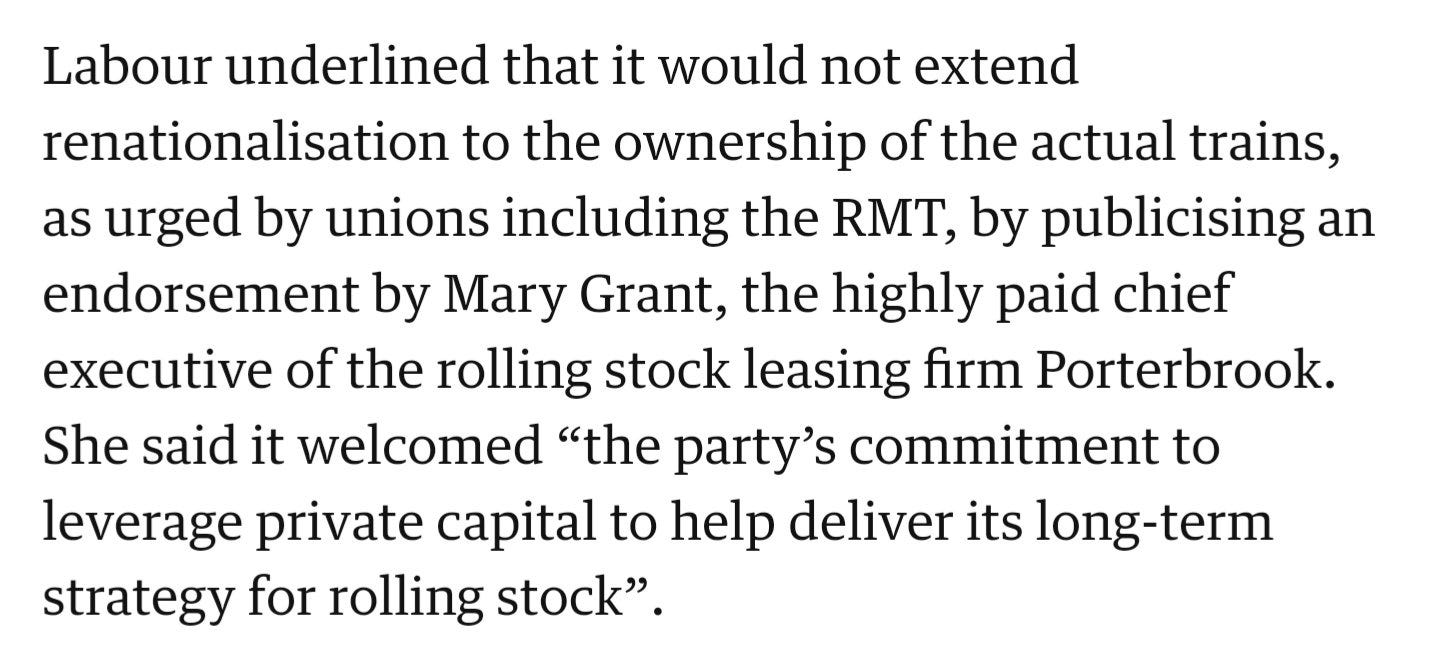Reasons to be sceptical of Labour's rail plan
There are loads of reasons to be sceptical of Labour's big policy announcement that they're going to (partially) renationalise the railways.
Labour has briefed the press that they’re planning to renationalise the railways and Britain’s noxious media class have dutifully and uncritically regurgitated the Labour press release into headline leading articles, including several that misleadingly claim "full renationalisation" and that it will happen "within five years".
Here are some of the many reasons to be sceptical of Labour’s rail plan.
It won’t end all private franchising
The main element of Labour’s rail plan is to bring rip-off privatised rail franchises back under public control as the contracts expire, however the Transport UK East Midlands franchise doesn’t expire until October 2030, meaning under this plan even the limited objective of ending rail franchising won’t be possible by the end of the next parliament.
The plan also allows small "Open Access" private companies like Lumo and Hull trains to keep operating. However this isn’t actually a bad thing, because they add value to the system and unlike the big rail franchises they do not rely on government subsidies to bankroll their profits.
No end to outsourcing
One of the big worries with any renationalisation projects is the smoke and mirrors trick of sticking a nationalised label like Great British Railways on the operation, but continuing private profiteering behind the scenes via exorbitant outsourcing contracts.
When Labour are briefing that they’re planning to "crowd in private investment to stimulate innovation" that’s coded language to signal that private rail profiteers will still be welcome to keep gouging cash out of the system, just not through rail franchises.
Privatised freight rail
One of the things that’s clear is that Labour are not going to renationalise freight rail, and according to Labour List "the plans will include a statutory duty on Great British Railways to enable the growth of rail freight", which amounts to taking money out of publicly run passenger rail to subsidise the profits of private freight rail!
There are four main UK rail freight companies: Direct Rail Services (UK government), Freightliner (US rail conglomerate), DB Cargo UK (German government), and GB Railfreight (a British PLC), plus a number of smaller operators with only about fifty trains between them.
It’s difficult to see the justification for keeping this fragmented freight system, let alone using public cash to subsidise a separate UK state rail company, a private stock exchange listed company, the German state transport operator, and an American conglomerate.
ROSCOs
One of the worst aspects of Tory rail privatisation is going to be kept; the private rolling stock companies that extract the most profit out of the system by renting the trains to the operators.
If the state is going to maintain the tracks (as it does already) and operate all of the passenger services, why on earth would we insist on renting the trains from private profiteers, rather than owning them ourselves?
It makes no sense whatever, because there’s no way that the ten train leasing companies can offer more financial stability, leverage better prices, or borrow at lower interest rates than the UK government.
The only way it makes sense is if Labour has taken the decision to put the interests of the train-leasing millionaires ahead of the public interest.
England-centrism
This grand rail renationalisation announcement is profoundly England-centric, given that rail services in Scotland, Northern Ireland, and Wales are already publicly owned.
Fares
There is no commitment to significantly reduce the UK’s hyper-inflated fares to bring them back in line with other publicly operated rail services across Europe.
Rooting out the profiteers should bring down the cost of running the railways to a certain extent, but the reality is that big infrastructure like rail doesn’t exist to generate profit, it exists to facilitate prosperity in the rest of the economy.
The government could dramatically reduce fares, which would have the positive effect of increasing economic demand by putting more money into ordinary people’s pockets, but Labour look set to choose not to do this because they still can’t get their heads around the economic basics due to their myopic obsession with austerity book-balancing.
Innovation
Labour’s plan goes on about "innovative technology" and "digital strategies" as if they’re magical solutions to the lack of capacity, when what’s actually needed is heavy investment in new lines, upgrades, and restoration of salvageable lines from the Beeching Cuts.
It’s total fantasy to pretend that the use of a few apps and digital strategies could be enough to reverse so many decades of reckless cuts to and underinvestment in Britain’s rail infrastructure.
The reason Labour’s proposal resorts to this kind of magical thinking is that the required investment in Britain’s creaking rail infrastructure would go against Keir Starmer and Rachel Reeves infuriating policy of continuing Tory austerity ruination.
Wasn’t this just Bodger’s plan?
Many people have pointed out that Labour’s proposal is strikingly similar to Boris Johnson’s Great British Railways plan, and that most of the existing franchises have already been taken under public control already.
It’s a shame that Labour are so timid that they’re unwilling to be bold and go any further than the Tory solution to their own rail privatisation mess.
Network Rail debt
It’s often the case that the most interesting things are not what politicians talk about, but what they refuse to say.
There’s absolutely no detail in Labour’s proposal to explain what’s going to happen to the secret black hole of debt that Network Rail has built up by renting the tracks out to private profiteers for thirty years at far below the actual cost of maintaining them.
This debt now stands at an astounding £59 billion, and there’s no explanation of what’s going to be done about it.
Are they going to write it off? Are they going to weigh the new Great British Railways organisation with a £59 billion debt from inception?
All we can be sure of is that they won’t be going after the private profiteers that this debt was built up in order to subsidise by the back door.
Do you trust Keir Starmer?
Even if we take Labour at their word, this is a glacially slow partial renationalisation that relies on magical thinking, ignores glaring problems like lack of capacity and the £59 billion debt, keeps the actual trains in the hands of private profiteers, and offers little more than the Tories were.
However why on earth would anyone take Labour at their word, especially when it comes to renationalisation?
Keir Starmer lied through his teeth to con his way into the Labour leadership with "pledges" to renationalise water and energy, end internal Labour factionalism, increase taxes on the very rich, deliver a Green New Deal, and adopt ethical foreign policies, then he gleefully ripped them all up when he got his hands on power, and even bragged to Andrew Marr that he’d lie to people again if it helped him get even more power.
You’d have to be astoundingly naive to believe that this time he’s telling the truth about his plans, when his entire leadership so far has consisted of betrayals, broken pledges, watered-down policies, and downright complicity with Britain’s parasitical private profiteers.
Please consider setting up a small monthly GoCardless subscription. These really help.







Excellent article. I was particularly pleased to read the last three paragraphs. Starmer was, is and will be lying. Leopards and spots spring to mind.
Sounds almost as bad as the fustercluck of the NHS. Cherry picking profits, shattering public confidence and trust as things gradually get worse & more expensive than ever.